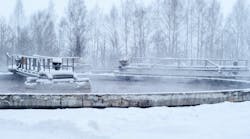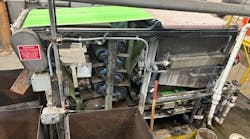For the second time this year, the Metropolitan Water Reclamation District of Greater Chicago’s (MWRD) Biosolids program manager and supervising civil engineer, Dan Collins, has been recognized for his expertise in management of biosolids, and this time, the request came from outside of the United States. Last winter, Collins was selected by the National Biosolids Management Program to mentor the city of Houston, Tex., wastewater agency's implementation of a biosolids program. This summer he traveled to Vancouver, Canada, where officials are developing a Biosolids Management Program (BMP). Collins was invited to provide practical advice and insight and to share his experience in developing an award-winning biosolids program.
Collins has worked with the MWRD for 25 years and has worked with the Biosolids program since 1991. He was instrumental in obtaining certification from the National Biosolids Partnership in 2008 and advancing to Tier 4 Platinum Level Certification in 2009. For the past three years, Collins has served as the Illinois Water Environment Assn. Biosolids chairperson and is on the National Association of Clean Water Agencies Biosolids Committee based in Washington, DC.
Biosolids are nutrient-rich, highly organic material developed through extensive treatment and are a superior, yet less expensive alternative to chemical fertilizer. Biosolids can be used in landscaping, for turf at parks and athletic fields and for agricultural crops. Biosolids are a better source of nutrients than chemical fertilizer and they also improve soil quality. MWRD’s biosolids are of exceptional quality based on federal standards and, as a service to municipal and commercial users, the MWRD offers and delivers biosolids at no cost.
“We are proud of our program and appreciate the opportunity to educate other wastewater treatment agencies on how they can use the material produced through their processes,” said Collins. “Many area golf courses, park districts and communities in the Chicago area are using biosolids to improve the quality of their turf and farmers in the nearby counties like the benefits of higher yields they receive by using biosolids.”
Roz Kempe, Metro Vancouver Biosolids project coordinator, explained how she met Collins. “I met Dan at the National Biosolids Partnership workshop in Virginia in May at which he gave an impressive presentation on Chicago’s Environmental Management System (EMS) story that immediately inspired me to invite him to give a similar presentation to our management,” said Kempe.
On June 27 and 28, Collins presented an overview of the MWRD’s processes and procedures to the Vancouver Sewerage and Drainage Utility Coordination Committee and its BMP Advisory Team. He also provided guidance and shared best management practices during a trial field audit while touring one of the organization’s five wastewater treatment plants.
“Dan’s efforts in assisting us with our BMP were extremely valuable and much appreciated among staff and managers,” said Chantal Babensee, Waste-to-Energy and Utility Residuals division manager, Metro Vancouver. “Dan’s guidance in preparing us for our internal audit and insights into improving our whole program were well received. Dan’s presentations to our division managers and wastewater treatment plant superintendents were successful in creating awareness of what an EMS entails for a similarly large corporation. The progress achieved has accelerated our BMP towards the next level of certification.”
MWRD Commissioner Frank Avila said that the agency strives for excellence in all of its programs, including in its management of biosolids. “We aim to go above and beyond regulatory requirements,” said Commissioner Avila. “It is a sign of success and a credit to our hard-working staff when you have other organizations across the continent asking for our insight. Our biosolids program has developed into a strong, well-managed process that takes treated waste and converts it into a superior, usable product.”
Source: MWRD

